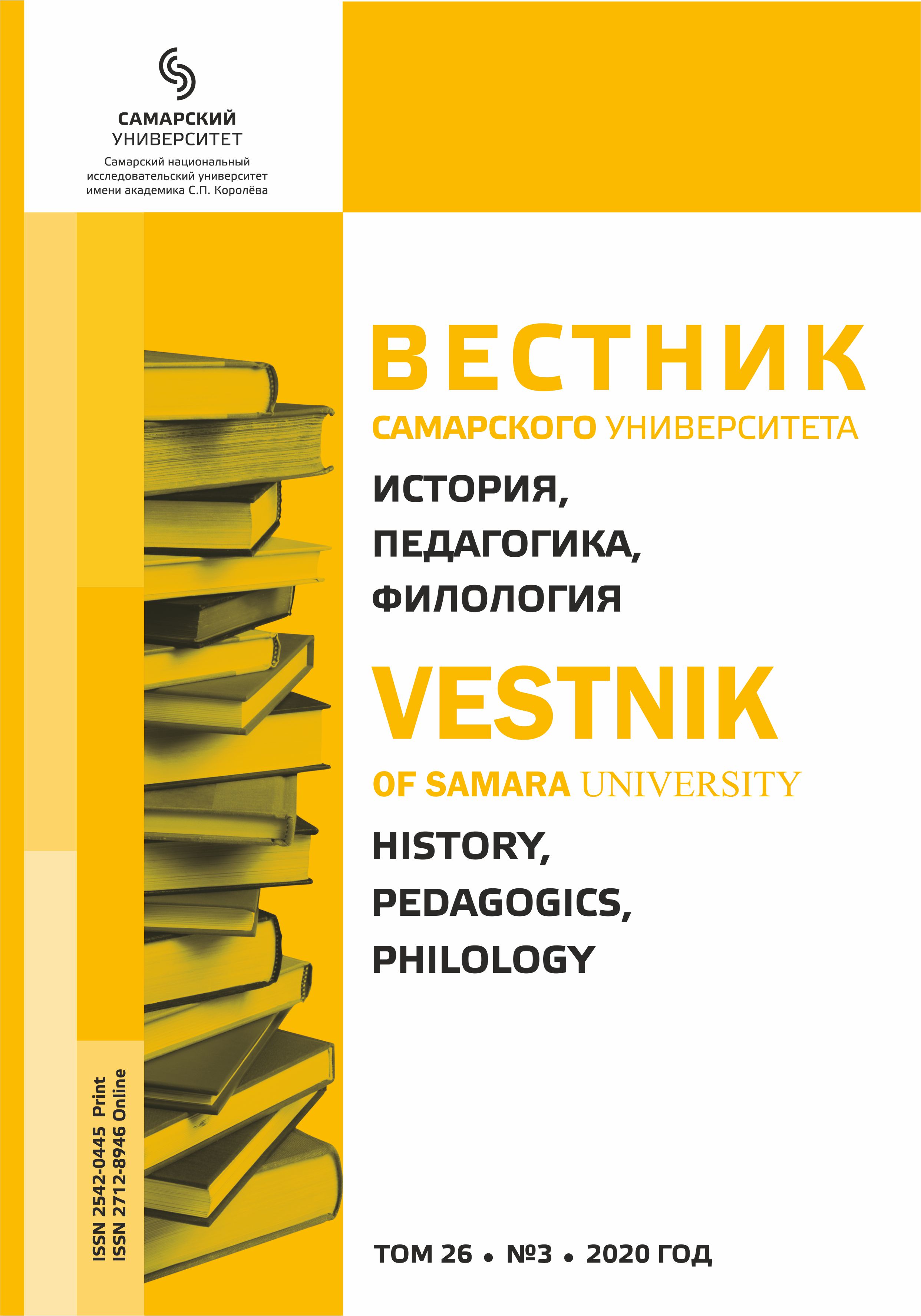Фразеология Урса Видмера: пример одного произведения
- Авторы: Стихина И.А.1
-
Учреждения:
- Уральский государственный экономический университет, г. Екатеринбург, Российская Федерация
- Выпуск: Том 26, № 3 (2020)
- Страницы: 114-120
- Раздел: Статьи
- URL: https://journals.ssau.ru/hpp/article/view/8195
- DOI: https://doi.org/10.18287/2542-0445-2020-26-3-114-120
- ID: 8195
Цитировать
Полный текст
Аннотация
В статье акцентируется внимание на неоднородности терминологии фразеологических исследований и на актуальности понимания фразеологии как совокупности характерных способов языкового выражения у отдельного автора. Цель исследования – выявить особенности фразеологии швейцарского немецкоязычного автора Урса Видмера (1938–2014) на материале конкретного произведения – цикле миниатюр под названием Berufe! («Профессии!»). Объектом исследования являются фразеологические единицы данного текста, а задачами – систематизация фразеологизмов, определение особенностей их модификаций, установление роли фразеологизмов в художественной семантике текста. Систематизация фразеологизмов приводит к выделению двух основных групп – немодифицированных и модифицированных фразеологизмов. Модифицированные фразеологизмы, в свою очередь, в соответствии с классификацией Г. Бургера, разделяются по способам модификации и анализируются на нескольких примерах. Выявляется, что в тексте превалируют немодифицированные фразеологизмы, а среди модифицированных главными оказываются формально-семантический и семантический способы модификаций. Классификация Г. Бургера становится наиболее подходящим способом упорядочить авторские модификации фразеологизмов в литературном произведении, поскольку она, базируясь на принципе семантической маркированности, выделяет формально-семантический тип модификаций, объединяющий как структурные, так и семантические сдвиги. В статье анализируется также влияние фразеологизмов и их модификаций на семантические и стилистические особенности художественного текста. Выявляется, что фразеологизмы способствуют созданию черт разговорного стиля, приема «потока сознания» и формированию общей экспрессивной тональности произведения. Также подтверждается, что фразеологизмы благодаря своей амбивалентной природе становятся генераторами языковой игры, которая возникает при их модификации. Результатами языковой игры являются создание комического эффекта, эффекта иронического дистанцирования и передача экспрессивной оценочной позиции автора. Статья намечает как дальнейшую перспективу исследования возможность определения особенностей «фразеологии автора» в рамках его литературного творчества в целом.
Об авторах
И. А. Стихина
Уральский государственный экономический университет, г. Екатеринбург, Российская Федерация
Автор, ответственный за переписку.
Email: morenov@ssau.ru
ORCID iD: 0000-0002-1955-6549
кандидат филологических наук, доцент кафедры иностранных языков, Уральский государственный экономический университет
Список литературы
- Burger 2003 – Burger H. Phraseologie. Eine Einführung am Beispiel des Deutschen.2, durchgesehene Auflage. (Grundlagen der Germanistik, 36). Berlin: Erich Schmidt Verlag, 2003. 224 S. URL: https://docplayer.org/33059471-Phraseologie-eine-einfuehrung-am-beispiel-des-deutschen-erich-schmidt-verlag-von-harald-burger-3-neu-bearbeitete-auflage.html.
- Černyševa 1984 – Černyševa I. Aktuelle Probleme der deutschen Phraseologie, 1984. In: Deutsch als Fremdsprache, 1/1984, S. 17–22.
- Gläser 1986 – Gläser R. Phraseologie der englischen Sprache. Tübingen: Niemeyer, 1986. 203 S. URL: https://books.google.ru/books?id=bHICZw-shIQC&hl=ru.
- Gläser 1998 – Gläser R. The Stylistic Potential of Phraseological Units in the Light of Genre Analysis / Rosemarie Gläser // Phraseology: theory, analysis, and applications / ed. by A.P. Cowie. Clarendon Press: Oxford, 1998. P. 125–143. URL: http://l49-60-100.cn.ru/for_polina/A._P._Cowie-Phraseology__Theory,_Analysis,_and_Applications-Oxford_University_Press(1998).pdf.
- Fleischer 1997 – Fleischer W. Phraseologie der deutschen Gegenwartssprache. 2, durchgesehene und ergänzte Auflage. Tübingen: Niemeyer, 1997. 299 S. doi: 10.1515/9783110947625.
- Lapinskas 2013 – Lapinskas S. Zu ausgewählten theoretischen Problemen der deutschen Phraseologie. Lithuania: Vilniaus universitetas / Universität Vilnius, 2013. 276 S. URL: https://www.docsity.com/de/lehrbuch-zu-ausgewaehlten-theoretischen-problemen-der-deutschen-phraseologie/5713031.
- Plashnyk 2009 – Ptashnyk S. Phraseologische Modifikationen und ihre Funktionen im Text. Eine Studie am Beispiel der deutschsprachigen Presse (= Phraseologie und Parömiologie 24). Baltmannsweiler: Schneider Verlag Hohengehren, 2009. 264 S.
- Балли 2001 – Балли Ш. Французская стилистика. 2-е изд., стереотип. Москва: Эдиториал УРСС, 2001. 392 с. URL: https://cruxbook.xyz/books/frantsuzskaya-stilistika.
- Баранов, Добровольский 1996 – Баранов А.Н., Добровольский Д.О. Идиоматичность и идиомы // Вопросы языкознания. 1996. № 5. С. 51–64. URL: http://vja.ruslang.ru/ru/archive/1996-5/51-64; https://www.elibrary.ru/item.asp?id=18933767.
- Володько 2014 – Володько Н.А. Ономастическое обновление фразеологизмов как прием языковой игры в современном русском языке // Молодой ученый. 2014. № 5 (64). С. 197–199. URL: https://moluch.ru/archive/64/9702.
- Мокиенко 2012 – Мокиенко В. Фразеология и языковая игра: динамика формы и смысла = Мокієнко Валерій. Фразеологія і мовна гра: динаміка форми і смислу // Учені записки Таврійського національного університету ім. В.I. Вернадського. Серія: Філологія. Соціальні комунікації. 2012. Т. 25 (64), № 2 (1). С. 100–109. URL: https://docplayer.ru/26846298-Frazeologiya-i-yazykovaya-igra-dinamika-formy-i-smysla-mokienko-valeriy.html.
- Ніколенко 2007 – Ніколенко А.Г. Лексікологія англійської мови – теорія і практика. Вінниця: Нова Книга, 2007. 528 с. URL: http://bookre.org/reader?file=1477700.
- Потапова 2016 – Потапова Н.А. Анализ понятий «пословица» и «поговорка» в современной лингвистике // Мир науки, культуры, образования. 2016. № 6 (61). С. 358–361. URL: https://www.researchgate.net/publication/342452006_ANALIZ_PONATIJ_POSLOVICA_I_POGOVORKA_V_SOVREMENNOJ_LINGVISTIKE; https://www.elibrary.ru/item.asp?id=27652389.
- Рыбакова 2012 – Рыбакова Е.А. Игры с фразеологизмами в языке современной немецкой молодежи // Вестник КГУ им. Н.А. Некрасова. 2012. Т. 18, № 4, С. 102–105. URL: https://www.elibrary.ru/item.asp?id=18935151.
Дополнительные файлы













